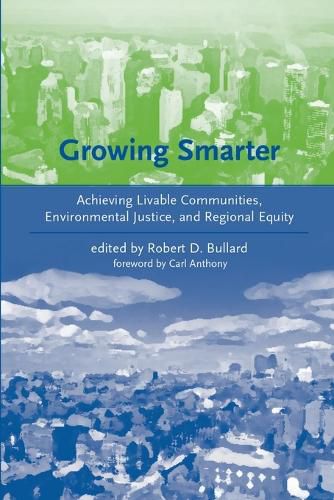Readings Newsletter
Become a Readings Member to make your shopping experience even easier.
Sign in or sign up for free!
You’re not far away from qualifying for FREE standard shipping within Australia
You’ve qualified for FREE standard shipping within Australia
The cart is loading…






In this work, experts from academia, government, and nonprofit organizations offer an environmental justice perspective on Smart Growth, discussing equitable solutions to suburban sprawl and urban decay. The smart growth movement aims to combat urban and suburban sprawl by promoting livable communities based on pedestrian scale, diverse populations, and mixed land use. But, as this book documents, smart growth has largely failed to address issues of social equity and environmental justice. Smart growth sometimes results in gentrification and displacement of low- and moderate-income families in existing neighborhoods, or transportation policies that isolate low-income populations. Growing Smarter is one of the few books to view smart growth from an environmental justice perspective, examining the effect of the built environment on access to economic opportunity and quality of life in American cities and metropolitan regions. The contributors to Growing Smarter - urban planners, sociologists, economists, educators, lawyers, health professionals, and environmentalists - all place equity at the center of their analyses of place, space, and race.
They consider such topics as the social and environmental effects of sprawl, the relationship between sprawl and concentrated poverty, and community-based regionalism that can link cities and suburbs. They examine specific cases that illustrate opportunities for integrating environmental justice concerns into smart growth efforts, including the dynamics of sprawl in a South Carolina county, the debate over the rebuilding of New Orleans after Hurricane Katrina, and transportation-related pollution in Northern Manhattan. Growing Smarter illuminates the growing racial and class divisions in metropolitan areas today - and suggests workable strategies to address them.
$9.00 standard shipping within Australia
FREE standard shipping within Australia for orders over $100.00
Express & International shipping calculated at checkout
In this work, experts from academia, government, and nonprofit organizations offer an environmental justice perspective on Smart Growth, discussing equitable solutions to suburban sprawl and urban decay. The smart growth movement aims to combat urban and suburban sprawl by promoting livable communities based on pedestrian scale, diverse populations, and mixed land use. But, as this book documents, smart growth has largely failed to address issues of social equity and environmental justice. Smart growth sometimes results in gentrification and displacement of low- and moderate-income families in existing neighborhoods, or transportation policies that isolate low-income populations. Growing Smarter is one of the few books to view smart growth from an environmental justice perspective, examining the effect of the built environment on access to economic opportunity and quality of life in American cities and metropolitan regions. The contributors to Growing Smarter - urban planners, sociologists, economists, educators, lawyers, health professionals, and environmentalists - all place equity at the center of their analyses of place, space, and race.
They consider such topics as the social and environmental effects of sprawl, the relationship between sprawl and concentrated poverty, and community-based regionalism that can link cities and suburbs. They examine specific cases that illustrate opportunities for integrating environmental justice concerns into smart growth efforts, including the dynamics of sprawl in a South Carolina county, the debate over the rebuilding of New Orleans after Hurricane Katrina, and transportation-related pollution in Northern Manhattan. Growing Smarter illuminates the growing racial and class divisions in metropolitan areas today - and suggests workable strategies to address them.